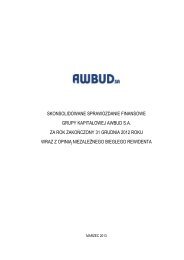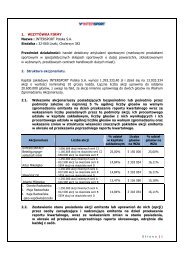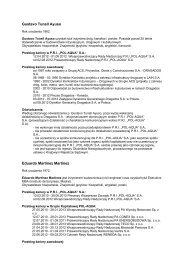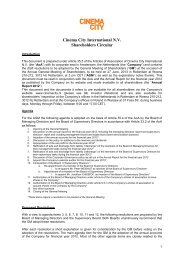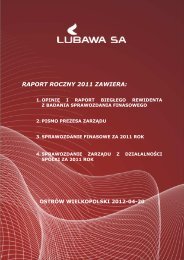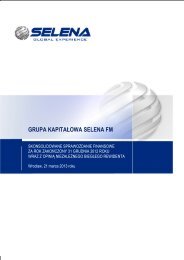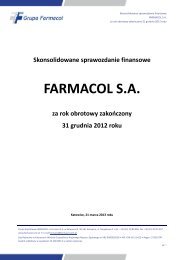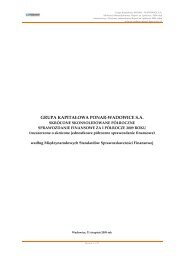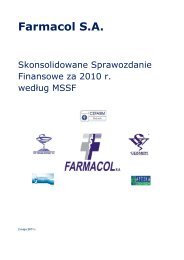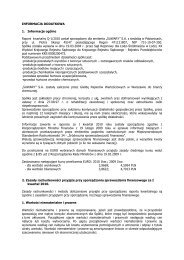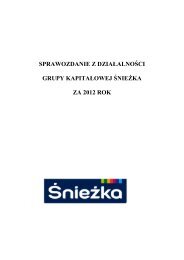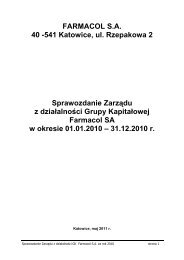DIRECTORS' REPORT ON PGNiG SA'S OPERATIONS ... - Notowania
DIRECTORS' REPORT ON PGNiG SA'S OPERATIONS ... - Notowania
DIRECTORS' REPORT ON PGNiG SA'S OPERATIONS ... - Notowania
Create successful ePaper yourself
Turn your PDF publications into a flip-book with our unique Google optimized e-Paper software.
Directors’ Report on <strong>PGNiG</strong> S.A.’s Operations in 2008<br />
while verifying costs of operating activities, the President of URE may consider certain cost<br />
unjustified or may reject the assumptions adopted by <strong>PGNiG</strong> S.A. with respect to main drivers of cost<br />
changes and profit targets allowing for business risk. The URE may also refuse to accept tariff prices<br />
and charge rates applied for by <strong>PGNiG</strong> S.A. Lower tariff prices and charges might adversely affect<br />
<strong>PGNiG</strong> S.A.’s profitability.<br />
Forecasting Risk<br />
The current methodology for calculation of prices and charge rates is based on forecast values;<br />
accordingly, revenue is encumbered with forecasting risk. Inaccurate estimates of demand affecting<br />
the accuracy of forecast purchase and supply volumes, as well as the value of costs on which the<br />
determinations of prices and charge rates are based may adversely affect financial results. An increase<br />
in demand above the forecast level would necessitate additional purchases under all existing contracts<br />
(in numerous cases, at prices higher than those forecast).<br />
Market Risk<br />
Prices of imported gas are determined in USD or EUR, and are based on indexation formulae<br />
reflecting the prices of petroleum products. Changes in foreign exchange rates and prices of petroleum<br />
products materially affect acquisition cost of imported gas. The market of crude oil and petroleum<br />
products has recently been to a large extent unpredictable, given the continual price changes. These<br />
material changes in fuel prices on the international markets affect the prices of imported gas. Each,<br />
even accurate forecast of changes of natural gas prices is encumbered with a high error risk. There can<br />
be no assurance that, despite legal possibility of adjusting the prices approved for a tariff term, an<br />
increase in the price of imported gas may not be fully passed on customers or the changes in selling<br />
prices may lag behind the changes in import prices.<br />
Risk of Competition<br />
In recent years, the increase in prices of fuels on global markets has led to increased interest in<br />
exploration activities. There is a risk of competition from other companies active on the Polish market<br />
seeking licenses for exploration and prospecting of deposits or the implementation of a strategy<br />
providing for acquiring access to own hydrocarbon reserves. At present, competition in the domestic<br />
market is limited. However, after having been granted relevant licenses, <strong>PGNiG</strong> S.A.’s competitors<br />
will enter the Polish market. A strong competitive edge may be gained especially by large companies<br />
which enjoy established positions on the international markets and have access to much greater<br />
financial resources compared with <strong>PGNiG</strong> S.A., helping them to accept the high risk of exploration<br />
activities in Poland.<br />
2. Act on Reserves of Crude Oil, Petroleum Products and Natural Gas<br />
The Act on Reserves of Crude Oil, Petroleum Products and Natural Gas, as well as Rules of procedure<br />
to be followed when the national fuel security is threatened or the petroleum market is disturbed<br />
regulates the issues related to ensuring the national fuel security, including the rules for creating,<br />
maintaining, and financing the reserves of natural gas by those energy companies whose business<br />
involves international trade in natural gas or which are importing gas for their own needs. The Act<br />
introduces certain changes with respect to the business activity conducted by <strong>PGNiG</strong> S.A.:<br />
• It sets the timetable for creation of mandatory stocks of natural gas; it stipulates that in 2012, the<br />
volume of mandatory stocks will cover 30 days’ average daily imports of gas;<br />
• It provides for return on capital employed in storage activity of at least 6%;<br />
• It stipulates that cost related to maintaining, releasing and supplementing reserves is justified<br />
operating cost within the meaning of Art. 3.21 of the Polish Energy Law.<br />
17 of 55



